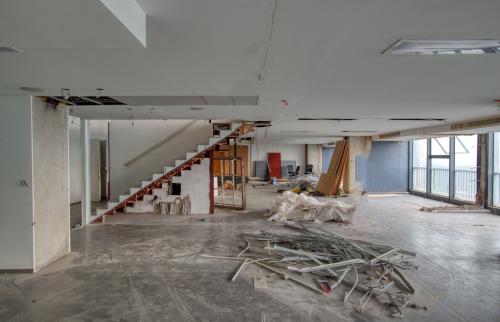Following last week’s announcement by Governor Godwin Emefiele that the Central Bank of Nigeria (CBN) allows the naira (N) to float freely, the Nigerian currency fell by 22 percent to N253.50 per dollar today.
The CBN’s decision should not be a surprise, as the Nigerian economy has been suffering from the steep fall in oil prices since mid-2014. Economic growth has turned negative for the first time since 2004, and inflation has reached levels last seen in 2010. Real GDP growth fell to -0.4 percent (year-on-year) the first quarter of 2016, down from 2.1 percent in the last quarter of 2015. Inflation increased to almost 16 percent last month (following higher electricity tariffs and fuel prices). It is likely that the financial sector is experiencing higher nonperforming loans. Foreign investment has declined markedly, and foreign exchange reserves stood at $26.5 billion at the end of May 2016 (3.6 months of imports) down from $39 billion about two years ago.
It was becoming evident that the previous currency arrangement, which held the naira at an official exchange rate of N197 per dollar and restricted access to foreign currency, was not helping achieve an orderly adjustment to the severe terms of trade shock the country experienced. Nigerian policymakers had de facto given up the option of letting the currency absorb some of the shocks. Choosing to peg the naira left fiscal policy the major if not the sole policy tool for managing the oil shock. But that was a risky decision, especially in the absence of an adequately funded oil fund (as the Excess Crude Account was depleted).
Supporting policies
President Buhari’s recent op-ed in The Wall Street Journal explains the priorities of his administration: fight corruption, rebalance away from oil dependence, and, through that shift, create durable economic growth. But for growth to return to positive territory and Buhari to achieve his goals, he needs to first enact policies to combat a number of challenges.
- Attacks on the country’s oil infrastructure must be stopped. Oil production is estimated to be at its lowest level in more than two decades. Attacks by the Niger Delta Avengers on oil pipelines have hit the country’s oil production hard. The expected increase in oil revenues following the increase in the price of oil ($47 per barrel now compared to a budget benchmark price of $38) has not materialized as oil production has fallen (from 2.2 million barrels per day to, at most, 1.4 million in May). The country is no longer the number-one African oil producer, slipping behind Angola. The credibility of Nigeria as a reliable supplier should be safeguarded in order to reignite its growth.
- Planned initiatives to increase non-oil revenues must be given a high priority in order to help compensate for the fall in oil revenues. In the first half of the year, the fall in economic activity is not likely to generate the expected tax revenues that were envisioned in the budget. Delays in passing the budget mean, however, that the decline in revenues may have been accompanied by lower expenditures, which may have helped reduce its impact on the deficit. Increasing the VAT rate would complement the government tax administration initiatives to raise more revenues. Although the VAT is a regressive tax, some of the increased revenues can be passed to the poorest segments of the population. At the same time, measures in the budget such as achieving a lean and cost-effective government and fighting corruption remain as relevant as ever.
- Policies in a new exchange rate regime: The biggest bang from the policy buck is expected to come from the effects of the increased flexibility of the naira on the economy. Government revenues from oil exports will increase in naira terms, and economic activity and foreign investment, it is hoped, will resume. There are some risks, however. If the exchange rate overshoots and the inflation rate increases sharply, then monetary policy will need to be used. The central bank could hike interest rates to manage inflation and avoid outflows/encourage inflows—but if too high for too long, those interest rates can hurt growth.
Credibility , credibility, credibility
Policy credibility will be needed to achieve an orderly adjustment as the CBN works to smooth the transition from a fixed exchange regime with a parallel market exchange rate to a floating exchange rate regime. To do this, the CBN needs to reduce uncertainty about the functioning of the currency market. However, some of the latest central bank’s announcements raise questions.
For instance, 41 items ranging from rice and cement to tomatoes are still classified as “Not Valid for Foreign Exchange,” which means that importers of these products will continue to face restrictions to access foreign currency. It is better to avoid the continuation of administrative measures as they will not eliminate the parallel exchange rate and will continue to create opportunities for arbitrageurs and corruption.
Also, the local press reported today that the CBN has changed the rules for the selection of primary dealers. Although some growing pains are to be expected when new markets are being set up, it will be important to converge rapidly to a well-functioning currency market. To do so, rules and regulations by the CBN on the functioning of the spot market as well as on the futures market will need to be clear and stable.
Lack of credibility about the functioning of the new exchange rate regime can push investors to continue adopting a wait-and-see attitude and postpone their investment decisions. This in turn will not help achieve the expected growth dividends from increased currency flexibility.
The Brookings Institution is committed to quality, independence, and impact.
We are supported by a diverse array of funders. In line with our values and policies, each Brookings publication represents the sole views of its author(s).




Commentary
Moving the naira to a flexible exchange rate must be accompanied by strong policies
June 20, 2016